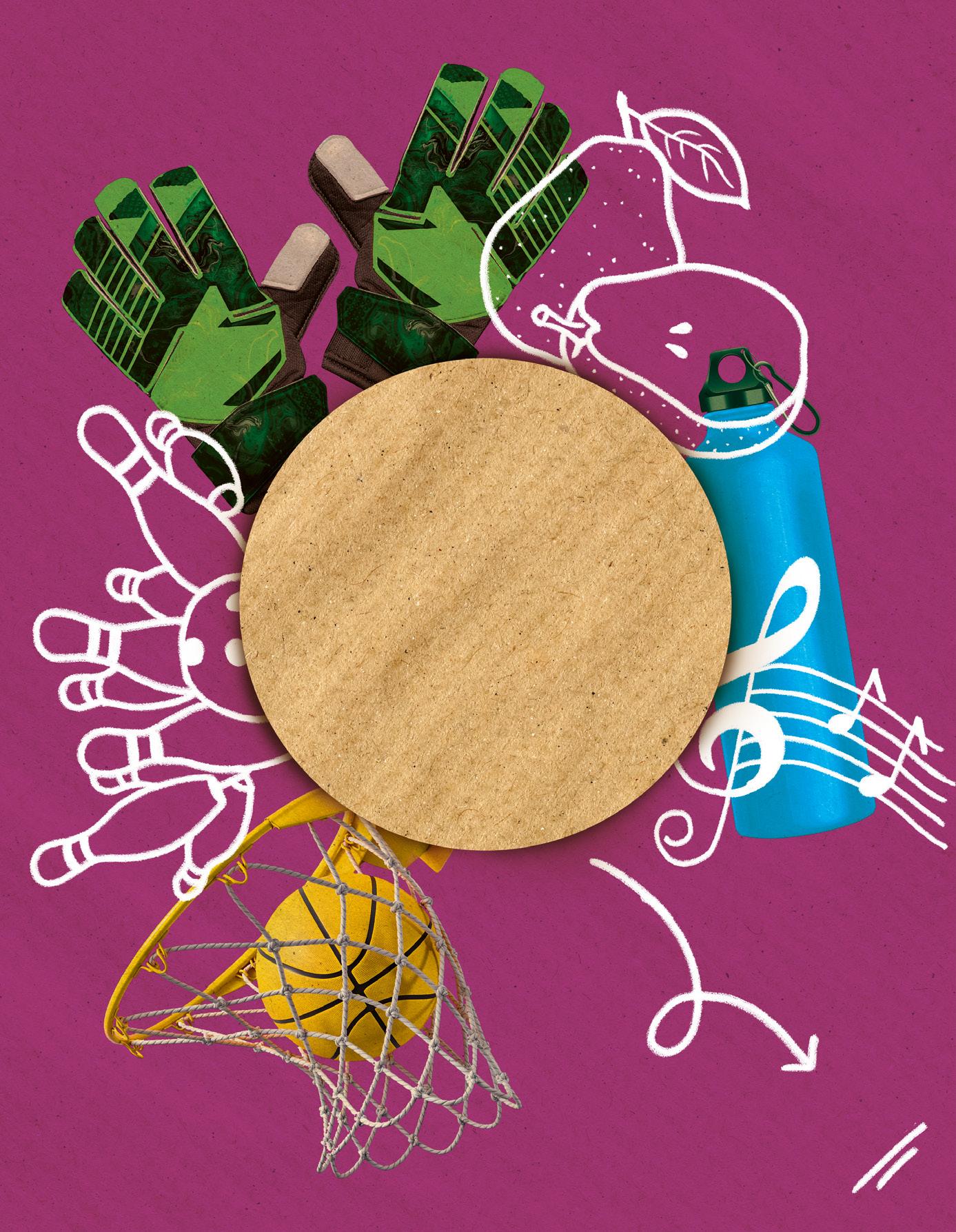
sample
PRIMARY 4
Globalaction Physical Education DIGITAL PROJECT INCLUDED
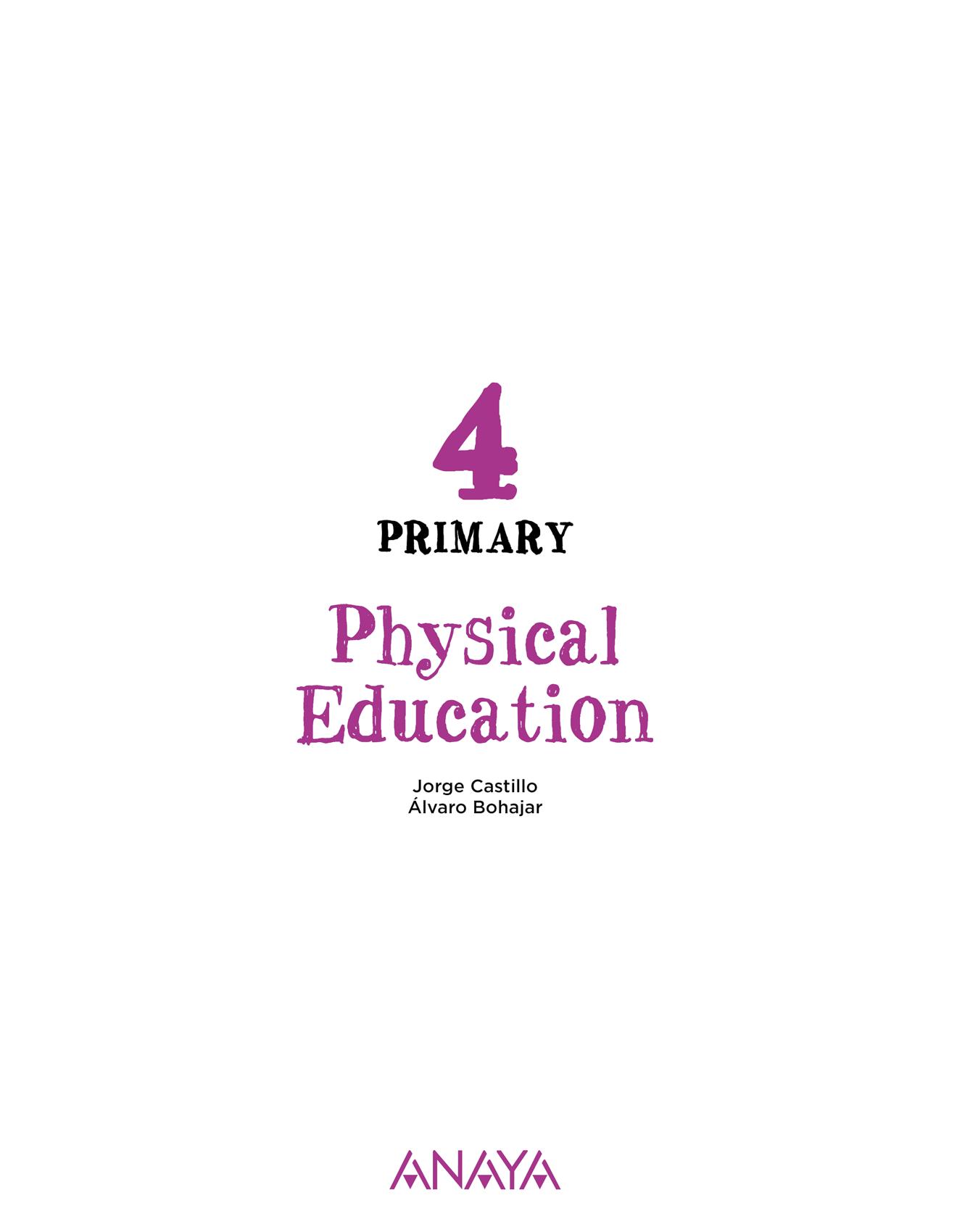
A breath of fresh air
Promote a healthy lifestyle, learn to understand your own body and that there are differences and similarities to other people.

Pack of cards
FAIR PLAY: SPORT AND WINNING
1 3 5
2 4 6
Encouraging sport
FAIR PLAY: IN THE WATER. LIFEGUARDS.
Make a pack of cards that represents the diversity in your classroom and help to celebrate our differences in everyday life.
FAIR PLAY: PHYSICAL ACTIVITY. REST
Make a video that shows that body language is best way to express ideas and feelings.
Understand that healthy habits, such as exercise and responsible consumption, bring people together.
Help everyone to integrate and recognise the value of diversity, which enriches us.




Understand the value of working together, it helps to achieve common goals and improves relationships.

Good health and well-being Quality education Partnerships for the goals Reduced inequalities Sustainable cities and communities Gender equality
6 28 50 16 38 60
EXPERIENCE • TARGET IN ACTION SDG PAGE
LEARNING
What an invention! Family games Teamwork
What are we going to learn?
LEARNING PLAY ZONE
• Breathing
• Heart rate
• Types of movement
• Imitation
• Hygiene
• Cooperation and opposition
• Physical abilities and basic motor skills
• The muscles, bones and joints
• Body language
• Good posture
• Values in sport
• Body language
• Forms of expression
• The mirror effect
• Jump
• Saturated and unsaturated fats
• Sport and nature
• Health and sport
• Beahviours that risk your health
• Time and space
• Types of spins
• Non-verbal communication
• The origin of games
• Popular and traditional games
• Relationships between people
• Throwing
• Dancing
• Warming up and cooling down
• Balance
• Receive
• The emotions in dance
• The different styles of dance
• Training
• Attitudes in sport
• The wandering marble
• The crazy line
• Run away
• Guess the film
• Charades
• Move the balloon
• Catch the ball
• Go for it
• The correct word
• Hidden message
• Group things
• Play and share
• Limited time
• In the olden days
• Where shall I put it?
• The correct sequence
• Don´t get saturated
• Korfball
• Don´t let it fall
• Ball snatcher
• The right moment
• Wandering skittles
• Decode the message
• Ball forward
• Tug of war
• The positivity list
• Surprise bounce
• I set the pace
• Pass the ball
• Balancing skills
• Juggling
• We love music!
• Let´s dance!
• Don´t fall down
• Goal ball
1 A breath of fresh air
Why
Your heart beats to a rhythm, it´s called your heart rate.
What do you think?
Your heart can be trained.
Can you measure your heart rate?
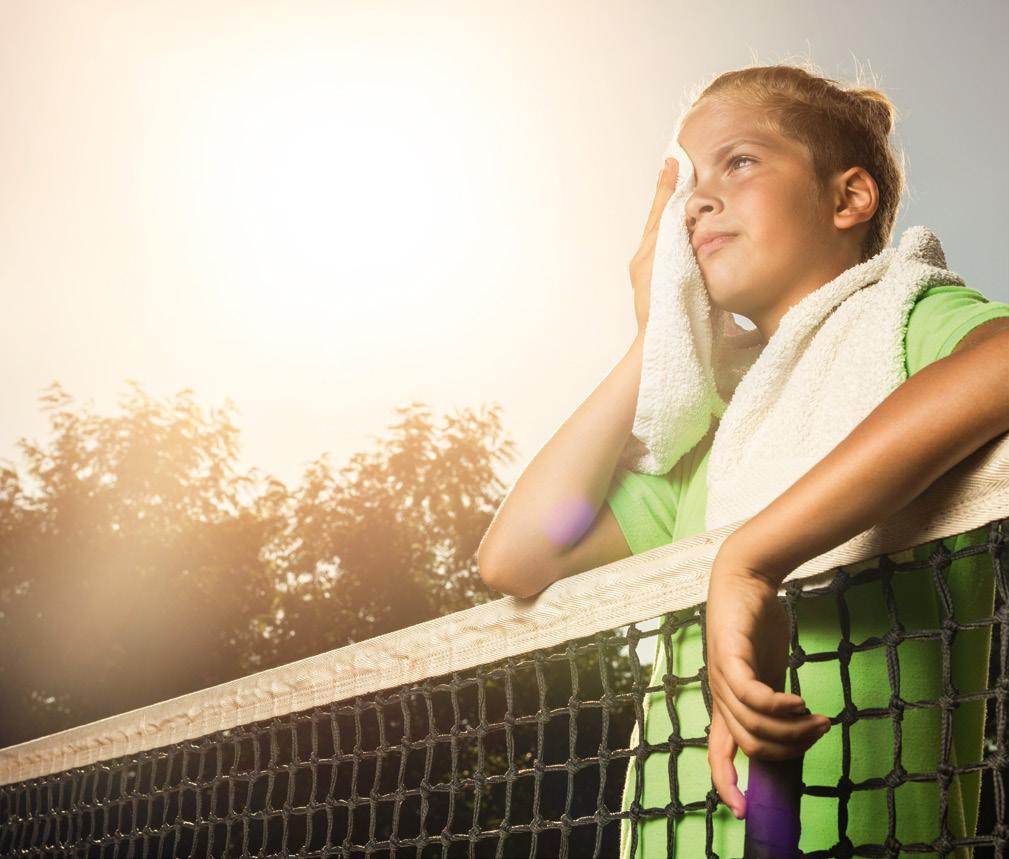







The facts
You´ll work on your skills
We can use technology to check our heart rate at any time.

Plan of action

Promote a healthy lifestyle, learn to understand your own body and that there are differences and similarities to other people.






Key concepts


11 10 U1 6 Match the children to the thing they are imitating. 7 Choose a fictional character. How would you imitate them? What objects can you use? Types of movements Imitation The ability to move around is a basic motor skill. Others are throwing and catching, spinning, rolling and jumping. There are two ways of moving around. Active, when you choose how to move around, what direction to go in, how fast and when to stop. Passive, when someone or something else moves you and you do not participate in the decisions. 4 Which children are moving around? Write your answer in your notebook and explain your answer. 5 Read these sentences. Write active passive in your notebook. a) My cousin Carla is two. Her mum and dad push her around in a pushchair: ? b) It’s good for me to walk home from school: ? Imitation means pretending to be another person, animal or object. To do a good imitation, you need to use your whole body: adopt different positions, make movements and gestures, use expressions and make sounds. a b c d 3 4 2 Run away Guess the film PLAY ZONE PLAY ZONE ¡¡ ¡¡ Do you remember what this movement is called? Respect is important for a good imitation. Learn more at anayaeducacion.es You´ll play games! Competency-based activities
each unit there is a and a final plan of action.
your book 9 8 Breathing allows your body to absorb oxygen from the air through your lungs (breathing in) and expel carbon dioxide (breathing out). You need to breathe to maintain your body’s vital functions. You do it instinctively. The more physical activity you do, the more your heart rate increases to give your muscles the oxygen they need. 1 Use these words to complete the sentences. Write them in your notebook. 2 Look at the pictures. When does the girl need the most oxygen? In your notebook write the order from to 3. The wandering marble The crazy line Breathing c breathe out a) You can breathe in through your b) When you ? you expel air from your body. c) You do this to get air into your lungs: 6
are you learning this? In
All about
3 7
Plan of action

















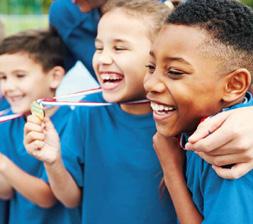
26 Fair play Sport Learning to lose If you lose you should always recognise your opponent’s skill, don´t make excuses or blame other people. Never be negative. Set yourself a new goal and go for it! Learning to win Winning is the reward you get for hard work and effort. You should celebrate without showing off, always show respect for your opponent. Don’t forget, your opponent has made an effort too. Sport is competition and in competitions everyone tries to win. But if you want to win, first you have to learn how to lose. 27 Winning The main thing is to take part Everyone who achieves a goal through effort and hard work is a winner, not only the winner. When you understand that, you know you understand the values of sport and fair play. Getting good marks is also winning. Overcoming difficulties, making progress and improving at any time in your life is winning too. Good team spirit means the freindship, support and solidarity of all the people in a team. It is the guarantee of the team’s success. In sport, the most important thing is to take part and enjoy yourself, even though the ultimate aim of any competition is to win.
Fair play PORFOLIO W hat did I learn? b) What things could improve? How? 14 Copy the emoticon that reflects your attitude in PE class. 11 Use these words to complete the sentences. Write them in your notebook. Then use the first letter of each answer to find the mystery word. Traffic lights: Colour in next to the activities. know how to do it need help don’t know how to do it 2 3 4 ? ? ? 1. When you breathe out, you ? air 2. You should brush your ? three times a day. 3. When you breathe in, you take ? into your lungs. 4. ? a is your body’s ability to absorb oxygen from the air. expel teeth breathing air U1 learn? H ow did I do? 12 How did you feel? Write it in your notebook. You can use words, drawings or emoticons. a) What would make you feel better? 13 Think about your development during this unit. Answer the questions in your notebook. a) What positive things did I discover about myself? b) What things could improve? How? 14 Copy the emoticon that reflects your attitude in PE class. to complete the sentences. Write them in your use the first letter of each answer to find the In pairs, find out how to measure your heart rate. Remember to do it at the beginning and end of PE class. Then, using the logic wheel technique, find out why it is important to know your heart rate and how to train it. in next to the activities. it to do it 2 3 4 ? ? ? breathe out, you ? air brush your ? three times a day. breathe in, you take ? into your lungs. body’s ability to absorb oxygen from the air. teeth breathing air What can make your heart rate higher or lower? What is your heart rate before and after doing sport? How can we control our heart rate? What is your heart rate? 1 2 3 4 Heart rate U1 7 Porfolio And a great digital project from Anaya to you: a global response to a diverse learning environment Edudynamic is: Intuitive Downloadable Simple Multi-device Synchronisable Universal 9:45 AM 100% adiP Icons Cooperative learning ICT Gameplay SDG Emotional learning Listening Learning to think Assessment Observa y completa. Comprobar Otra Vez RespirarBreathe Look and complete. Try again
And in every term...
1 A breath of fresh air
Your heart beats to a rhythm, it´s called your heart rate.
What do you think?
Your heart can be trained. Can you measure your heart rate?

The facts
We can use technology to check our heart rate at any time.
Target in action
Promote a healthy lifestyle, learn to understand your own body and that there are differences and similarities to other people.
6


3 7
Breathing
Breathing allows your body to absorb oxygen from the air through your lungs (breathing in) and expel carbon dioxide (breathing out). You need to breathe to maintain your body’s vital functions. You do it instinctively.
The more physical activity you do, the more your heart rate increases to give your muscles the oxygen they need.

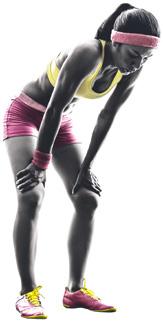


1 Use these words to complete the sentences. Write them in your notebook.
nose breathe in mouth breathe out
a) You can breathe in through your ? or your ?
b) When you ? you expel air from your body.
c) You do this to get air into your lungs: ?

2 Look at the pictures. When does the girl need the most oxygen? In your notebook write the order from 1 to 3. The wandering marble PLAY


8
¡¡
ZONE
a c
Learning to control your breathing will make you better at sport.
My heart rate is faster now!
Your heart rate is the number of times your heart beats in a minute to send blood around your body.


When you increase your physical activity, and the effort you make, your heart beats faster. You also breathe faster to send more oxygen to your muscles.



3 Are these children’s hearts beating fast or slowly? Write the order in your notebook.



9 U1
PLAY ZONE ¡¡
c a d b
The crazy line
Heart rate
Types of movements
Do you remember what this movement is called?


The ability to move around is a basic motor skill. Others are throwing and catching, spinning, rolling and jumping. There are two ways of moving around.





• Active, when you choose how to move around, what direction to go in, how fast and when to stop.
• Passive, when someone or something else moves you and you do not participate in the decisions.
4 Which children are moving around? Write your answer in your notebook and explain your answer.
Learn more at anayaeducacion.es
Run away
5 Read these sentences. Write active or passive in your notebook.
a) My cousin Carla is two. Her mum and dad push her around in a pushchair: ?
b) It’s good for me to walk home from school: ?
10
¡¡
PLAY ZONE
Imitation
Respect is important for a good imitation.
Imitation means pretending to be another person, animal or object.
To do a good imitation, you need to use your whole body: adopt different positions, make movements and gestures, use expressions and make sounds.




7 Choose a fictional character. How would you imitate them? What objects can you use?


11 U1
6 Match the children to the thing they are imitating.
a b c d 1 3 4 2
the film
ZONE ¡¡
Guess
PLAY
Hygiene
Health is related to hygiene and looking after your body. To have good personal hygiene it is important to have a daily hygiene routine: brushing your hair, having a shower, brushing your teeth and washing your hands and face. After any physical activity you should always wash yourself to get rid of sweat and bad smells.

8 Read the clues and solve the crossword in your notebook.

1. Piece of clothing you should change after PE class.

2. You have one every day and after doing sport.

3. Where you keep soap and shampoo.
4. Parts of your body you wash before eating.
5. Number of times you should brush your teeth every day.

Charades PLAY
ZONE
12
9 Think of everything you do as part of your daily personal hygiene routine. Write them in your notebook. ¡¡
2 ? 1 ? – ? ? ? ? ? 4 ? ? 3 ? ? ? ? ? ? ? 5 ? ? ? ? ? ? ? ? ?
I never forget to brush my teeth before going to bed.
Cooperation and opposition
When you play games or do sport sometimes you work together and sometimes you compete.
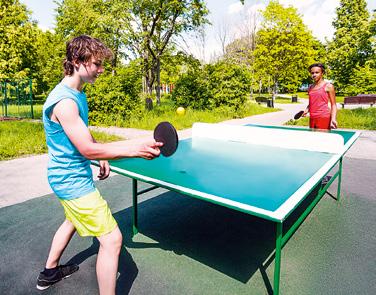
Cooperation
Everyone who participates collaborates and forms a team to achieve a common goal.
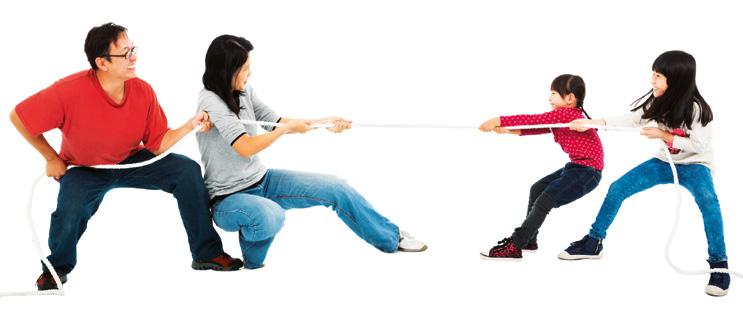



Opposition
You try to stop your opponent from achieving their goal, while you try to win.
Cooperation-opposition
Your team tries to achieve its common goal, while stopping the other team from doing the same.
10 Read and match. Write the answers in your notebook.
The whole class works to make the game a success.
You compete against everyone else in a race.
You have to work as a team to win.
Move the balloon PLAY ZONE
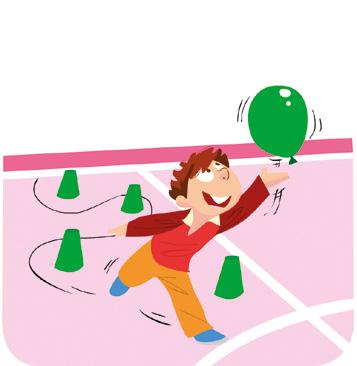
13 U1
¡¡ Cooperation-opposition Opposition
1 2
Cooperation
a b c 3
W hat did I learn?
11 Use these words to complete the sentences. Write them in your notebook. Then use the first letter of each answer to find the mystery word.
1. When you breathe out, you ? air .
2. You should brush your ? three times a day.

3. When you breathe in, you take ? into your lungs.
4. ? a is your body’s ability to absorb oxygen from the air.

? ? ? ?
Traffic lights: Colour in next to the activities.
I know how to do it
I need help
I don’t know how to do it
14 PORFOLIO
1 2 3 4
expel teeth breathing air
In pairs, find out how to measure your heart rate. Remember to do it at the beginning and end of PE class. Then, using the logic wheel technique, find out why it is important to know your heart rate and how to train it.
How can we control our heart rate?

How did I do?
What is your heart rate?
What can make your heart rate higher or lower?
What is your heart rate before and after doing sport?
12 How did you feel? Write it in your notebook. You can use words, drawings or emoticons.

a) What would make you feel better?
13 Think about your development during this unit. Answer the questions in your notebook.
a) What positive things did I discover about myself?
b) What things could I improve? How?

14 Copy the emoticon that reflects your attitude in PE class.


U1 15
1
3
2
4 Heart rate
2 Pack of cards
We are all different and we all have the same rights and opportunities.
What do you think?
Can you make a card game that helps represent the diversity in your classroom?

The facts
The Universal Declaration of Human Rights recognises the equality of all people.
Target in action
Make a pack of cards that represents the diversity in your classroom and help to celebrate our differences in everyday life.
16


10 17
Physical abilities and basic motor skills




In PE class you work to improve your skills, which depend on the biological characteristics of your body (physical abilities) and your skill level (basic motor skills).


1 Read and match in your notebook. Then explain your answers.
If you practise, you’ll get better.
2 Look at the pictures. Which motor skill and physical ability are they using? Write your answers in your notebook.
18
¡¡
Catch the ball PLAY ZONE
a
Strength Moving around Stamina Jumping Speed Flexibility Spinning and rolling Throwing 1 2 a b c d 3 4 Basic motor skills Physical abilities
Everything is connected: if you work on one skill, you’ll improve in all of them.



You use your physical abilities (strength, stamina, speed and flexibility) and basic motor skills (moving around, jumping, rolling/spinning, throwing and catching) together, depending on the type of exercise you are doing.



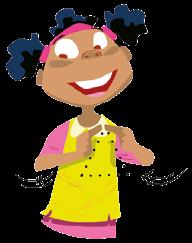
Go for it!

19 U2
3 Look at the pictures and the example for player 1. Copy the table for players 2 and 3 into your notebook and complete them.
¡¡
PLAY ZONE
3
1 2 3 4 5 6 7 8 9 10 0 Strength Stamina Speed Flexibility
The muscles, bones and joints
Your body responds as a single unit to the orders sent by your brain. Your muscles, bones and joints interact all the time, both when your body is moving and when it is at rest. Your body does some of the actions unconsciously, i.e. you don´t need to think about it. For example, it keeps your heart beating.


4 Complete the table in your notebook.
Bones
Femur Calf muscles
Tibia Buttocks
Muscle
Humerus Biceps Radius Dorsal muscles
Bones Muscles
Kicking a ball ? ? ? ?
Throwing a ball ? ? ? ?
5 Answer these questions in your notebook..
a) Describe an action your body does unconsciously.

b) Describe an action your body does consciously.

PLAY ZONE
The correct word

20
¡¡
The muscles of your back work all the time to keep you upright.
Body language
Your posture is your body’s way of talking. You use postures, or body language, every day to express yourself and arespond to its environment.

6 Look at their shoulders. What does their body language express in each case? Write your answer in your notebook.

7 How can you use your body to express curiosity? Describe it in your notebook.





21 U2
a
¡¡ Strength Anger Cold
Hidden message PLAY ZONE
When I feel tired, by body feels really heavy.
Good posture
Remember to always have good posture.
Good posture means having the right posture in every situation. Good posture helps you avoid injury.
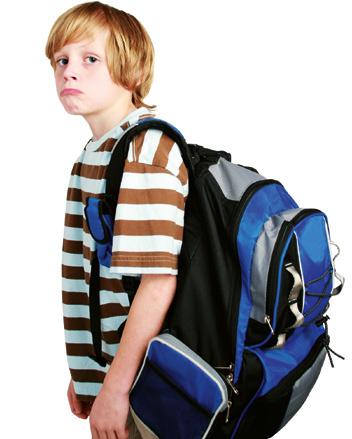


8 Look at the pictures. Which of these people have good postures? Write your answers in your notebook.
Learn more at anayaeducacion.es


9 Do you sometimes have bad posture? Explain in your notebook and say what you can do to correct them.
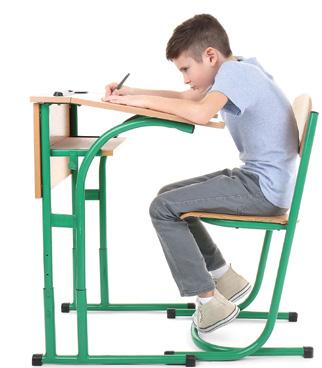
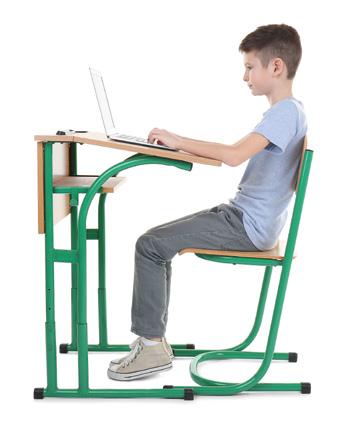
Group things PLAY ZONE

22
¡¡
a c b d
Values in sport

Say NO to bullying!
Sport teaches you values, such as respect, tolerance, teamwork and peaceful coexistence. These are important both on and off the field. They help create a good atmosphere in competitions and avoid conflict.
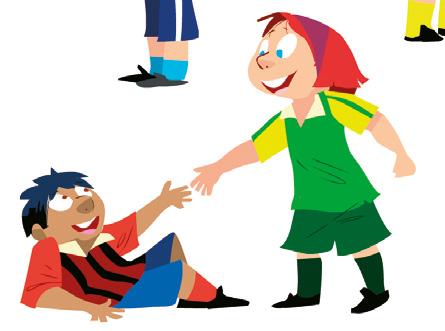
10 Look at the pictures. In your note book write which show a good, or bad, attitude during sport. Explain why the others are incorrect.
11 Have you ever seen someone behave badly during sport? Explain what happened in your notebook and how the situation was resolved.
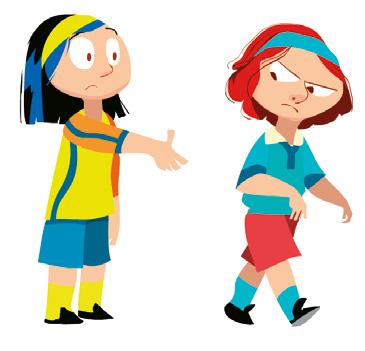
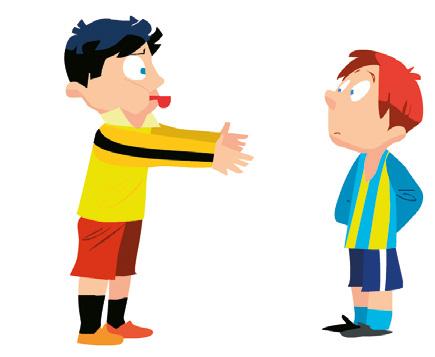



23 U2
Play and share
ZONE ¡¡
PLAY
a c
b
W hat did I learn?
12 Read and complete.
1. Action done to move an object as far away as possible. ? ? ? ? ? ? ? ?
2. Skill in which your body rotates or changes direction. ? ? ? ? ? ? ? ?
3. This allows you to communicate without words ? ? ? ? ? ? ? ? ? ? ? ?
4. This means making sure your body is in the correct position. ? ? ? ? ? ? ? ? ? ? ? ? ?

5. Games and sports encourage these. ? ? ? ? ? ?
13 Think of three reasons why good posture is so important. Write them in your notebook.

24 PORFOLIO
Traffic lights: Colour in next to the activities.
I know how to do it I need help I don’t know how to do it
Cut a rectangle of cardboard measuring Cut a rectangle of cardboard measuring 9 x 13 cm and draw your portrait. This card will be a part of a deck made by the whole class. Now play a game with the deck. Finally, make a list of 10 observations to answer these questions:


1 How are you similar to and different from the rest of your classmates?
2 ¿Las diferencias han sido un obstáculo para organizar el juego?
I participate actively in class. ? ? ?

I do the activities.
I apply what I learn.
I ask for help if I don’t understand something. ? ? ?
15 How is what you learned about good posture going to help you in your life?

Keep your back straight Bend your knees when you bend down
I ask for help if I don’t understand something.
16 Rest your back against the back of your chair when you sit down.
U2 25
Sport
Learning to lose
If you lose you should always recognise your opponent’s skill, don´t make excuses or blame other people. Never be negative. Set yourself a new goal and go for it!
Sport is competition and in competitions everyone tries to win. But if you want to win, first you have to learn how to lose.
Learning to win
Winning is the reward you get for hard work and effort. You should celebrate without showing off, always show respect for your opponent. Don’t forget, your opponent has made an effort too.

26 Fair play
Winning
The main thing is to take part
• Everyone who achieves a goal through effort and hard work is a winner, not only the winner. When you understand that, you know you understand the values of sport and fair play.
• Getting good marks is also winning. Overcoming difficulties, making progress and improving at any time in your life is winning too.
In sport, the most important thing is to take part and enjoy yourself, even though the ultimate aim of any competition is to win.
Good team spirit means the freindship, support and solidarity of all the people in a team. It is the guarantee of the team’s success.
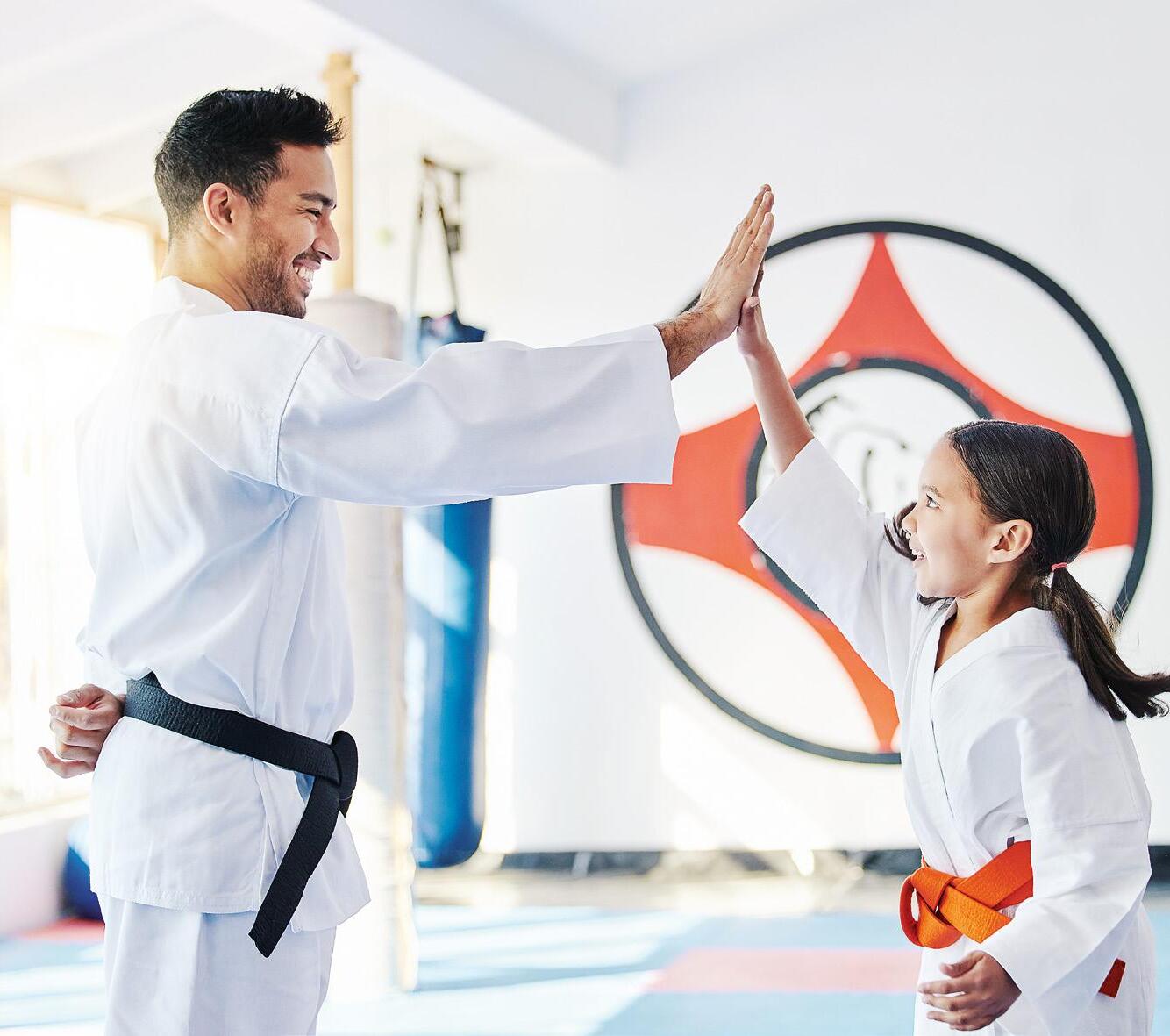
27









































































































